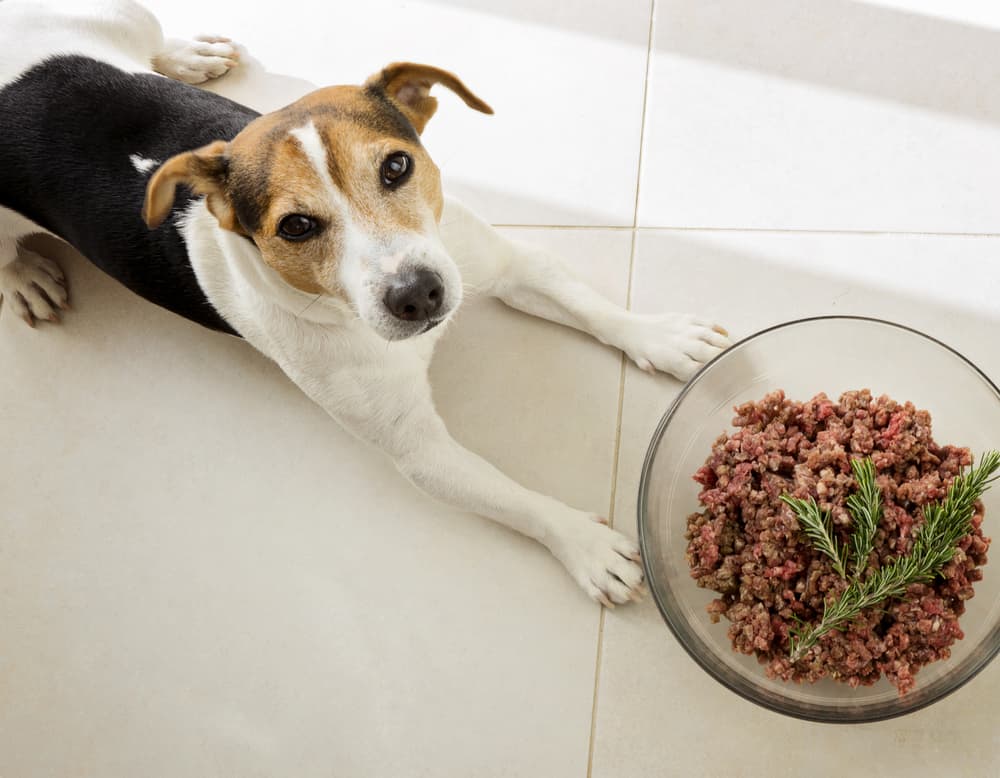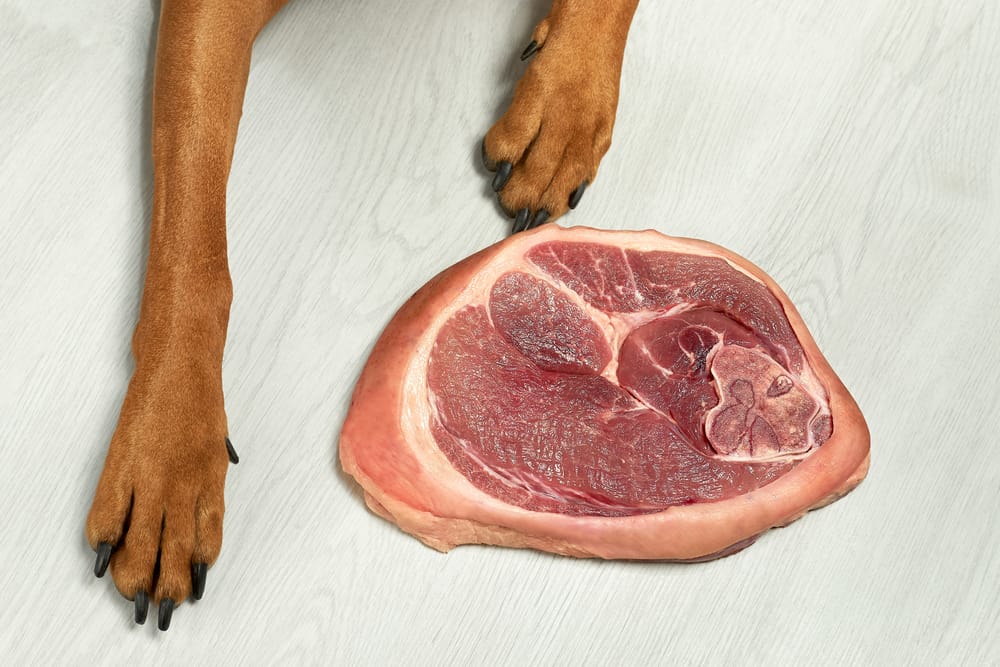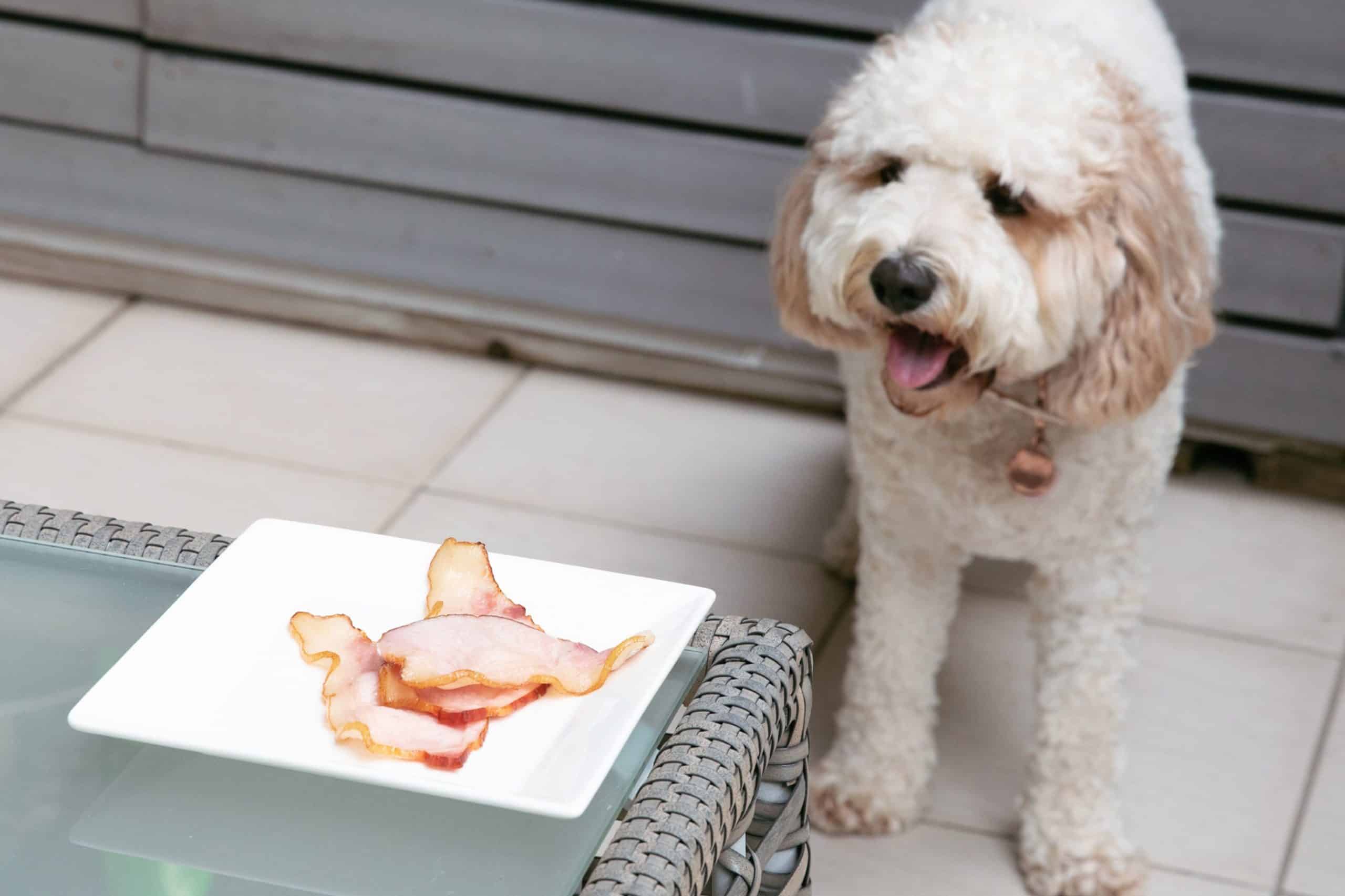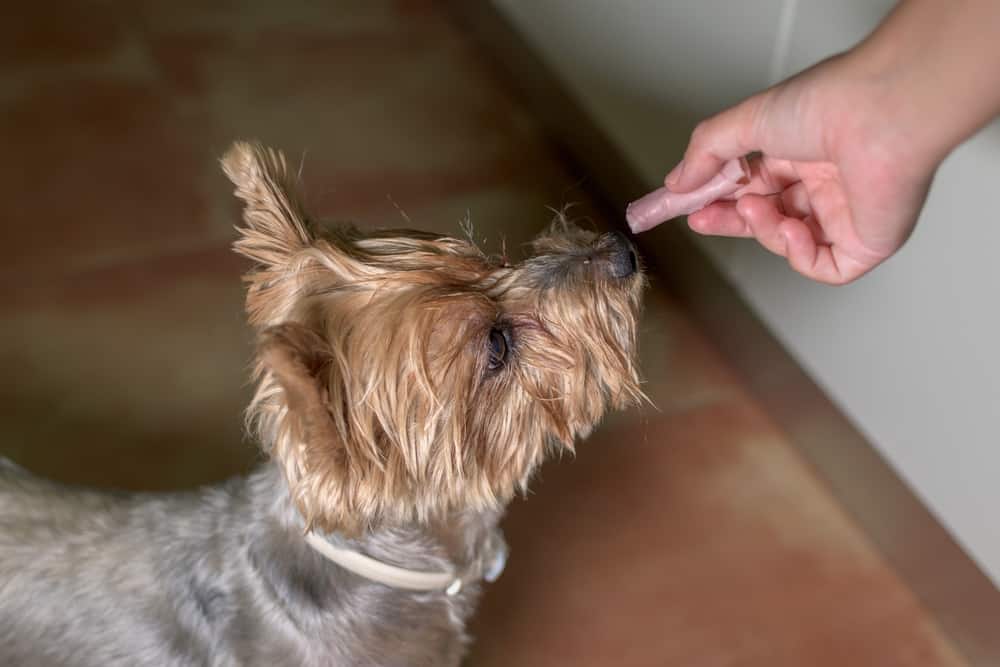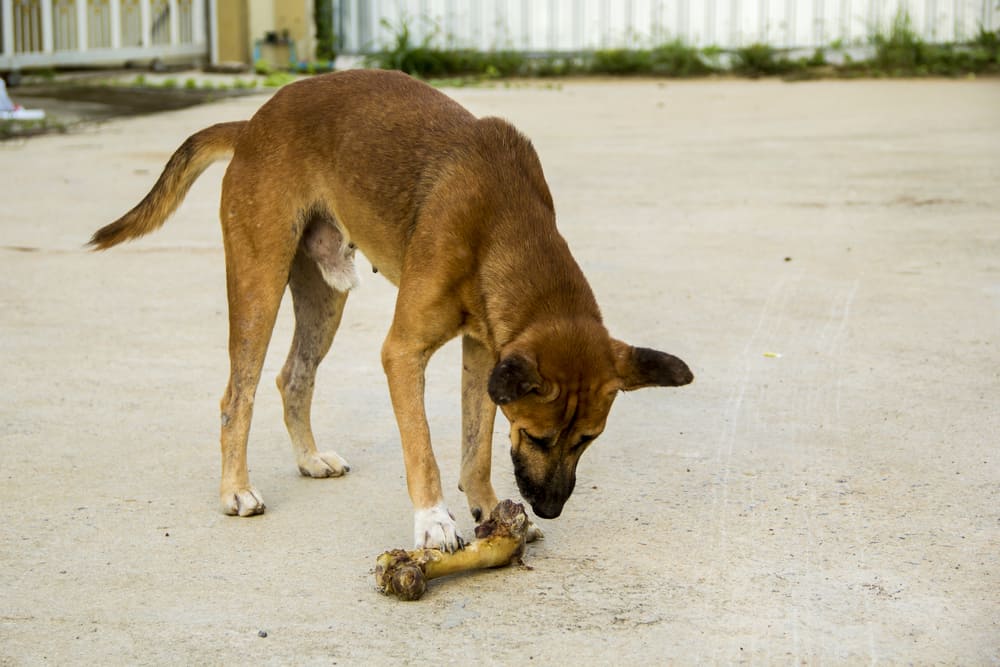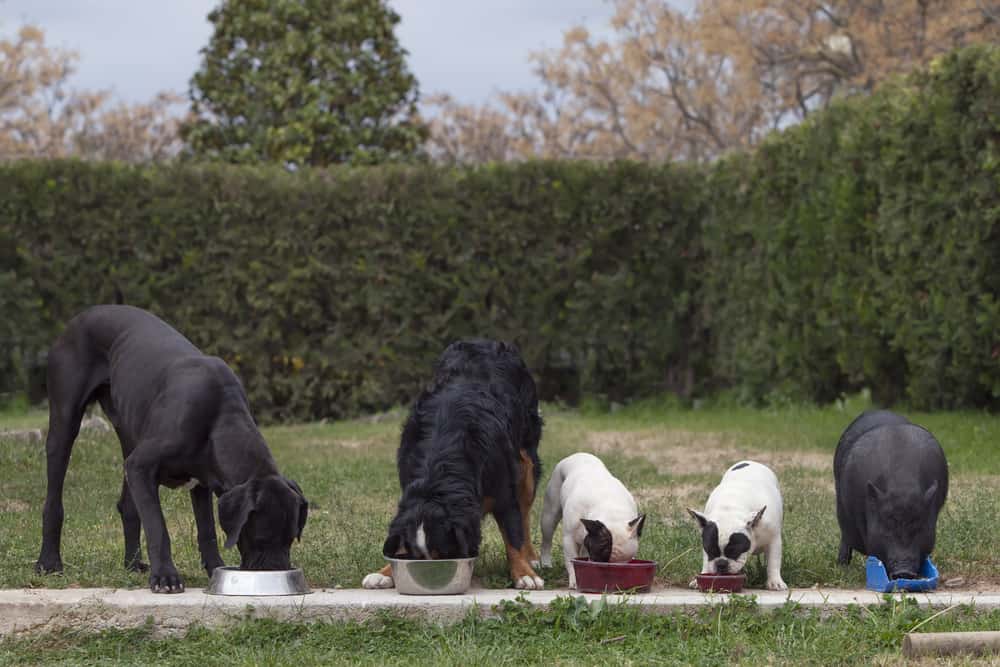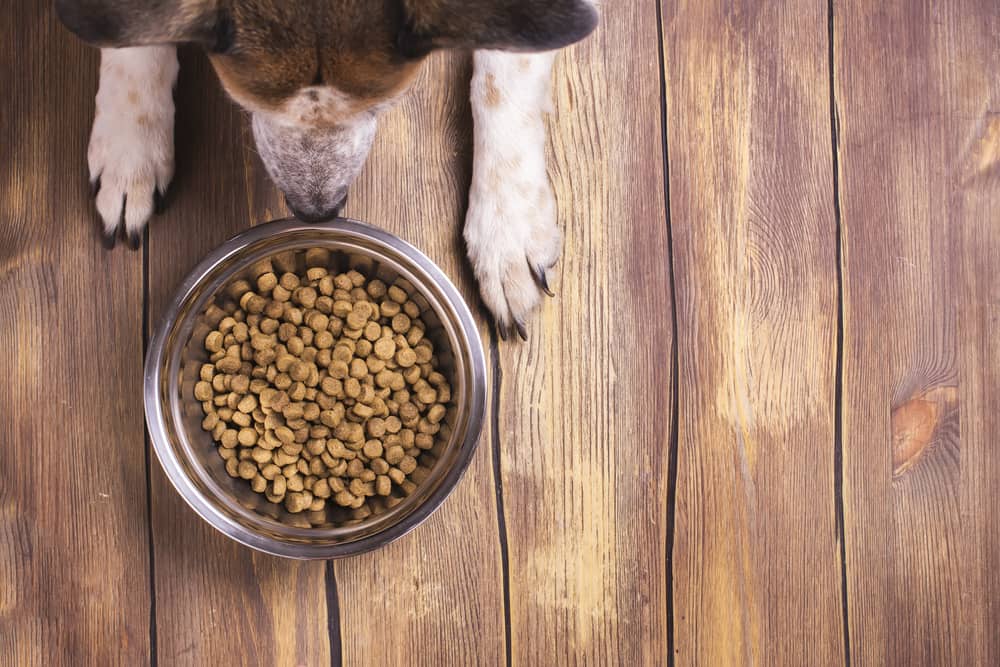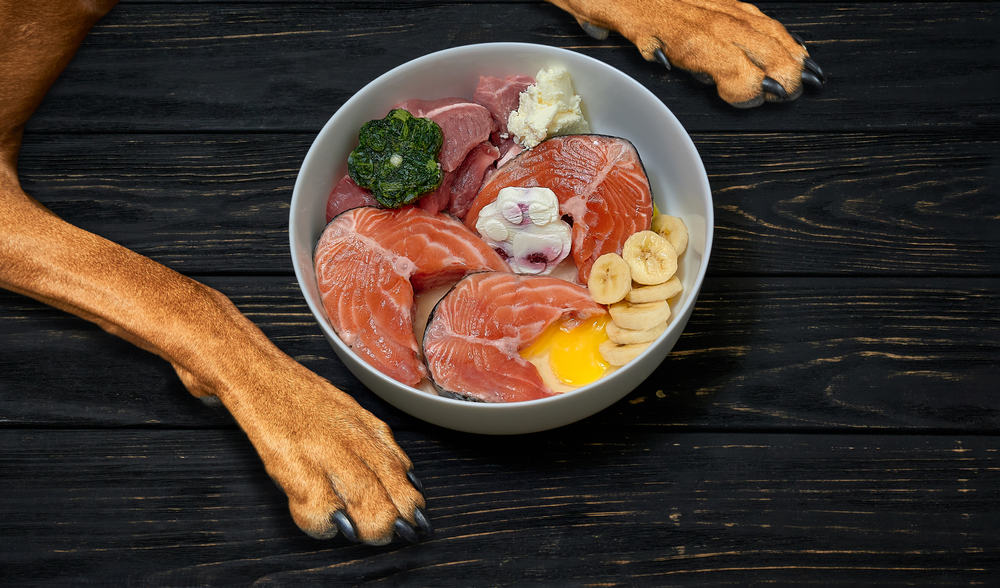If you’re planning to switch your doggo’s meat from chicken/beef to pork and are wondering if or not it is a good idea, you’re at the right place!
‘Can dogs eat pork?’ – The amount of misinformation relating to this question on the internet is crazy. It is absolutely understandable if you felt overwhelmed with all the ‘Yes’ and ‘No’ answers here and there.
In this post, we’ll dive deep into how healthy pork is for dogs, in which scenario it is okay to feed pork to your dog and in which it isn’t. Let’s get started!
Can Dogs Eat Raw Pork?
Pigs are prone to hosting parasitic roundworms and tapeworms, such as Trichinella spiralis, Taenia solium, and Taenia asiatica.
The roundworm T. spiralis causes Trichinellosis in its host. Likewise, the tapeworm infection is called Taeniasis. Both of these conditions can make humans as well as dogs critically ill if not treated. Trichinellosis symptoms in dogs are:
- Vomiting
- Diarrhea
- Anorexia
- Muscle pain
Likewise, some telltale signs of tapeworm-related infections in dogs are:
- Proglotid segments in faeces, anus, and fur
- Irritation around the anus and dog licking and biting the area
In order to kill these parasites and their larvae in pork, make sure to cook the meat to at least 160 degrees Farenheight before feeding it to your dog. Therefore, in order to keep your dog as well as you safe, feeding dogs raw pork is never recommended.
Can Dogs Eat Cooked Pork?
Contrary to most ‘internet opinions’, yes, cooked pork is a good source of protein for dogs. Pork can definitely be included in your dog’s balanced diet in moderate quantities.
The myth of pork not being able to digest by dogs has widely spread across the internet. The truth is that pork is, in fact, an easily digestible source of protein.
It is our speculation that the myths might have been based on the fact that most pig meat products are heavily processed. While cooked pork in a dog’s diet is emphasized by many vets, processed pig meat, on the other hand, is discouraged. We’ll discuss the ‘why?’ in the next section!
Can Dogs Eat Processed Pork?
Processed meat such as bacon, sausages, and hams should be fed to your dogs only in a small quantity occasionally. And if your pup is disciplined and doesn’t make such demands, it is better to never feed processed meat to them.
Processed meat is often high in fat and salt percentage. These ‘human’ food are not healthy for humans, let alone dogs. World Health Organization (WHO) has labeled processed meat as a ‘Class 1’ carcinogen.
High salt content food can motivate dogs to drink water heavily, which can cause bloat, also called Gastric dilatation-volvulus (GDV).
The fluid in the stomach can exert pressure on the surrounding organs, leading to an uncomfortable and painful health crisis. If medical care is not provided soon, this condition can even be life-threatening in pets.
Can Dogs Eat Pork Bone?
When it comes to giving your doggo a chew toy, always stick to recreational bones or edible dental bones treat from the pet store. Once cooked, bones can become dry and brittle. Your dogs will relish these bones nevertheless. However, you should refrain from giving them such bones.
When chewed, the bones will crack and splinter off. These sharp bone pieces can cause injuries and punctures to your dog’s soft tissues and organs. Cooked bones can also lead to constipation issues in your dog.
How to Cook Pork for Dogs?
If your doggo enjoys pork and you love cooking it for them often, you might be wondering if there are certain dos and don’ts that you need to follow.
Well, we’ll not dive deep into recipes here as you can find plenty of palatable and exotic dog food recipes on the internet. Here are 3 tips for you to ensure that you’re feeding pork to your dog healthily.
1. Be mindful of the seasonings:
Seasonings belonging to the allium family, including and not limited to garlic, onion, chives, and leek, are very toxic to dogs.
These edibles have thiosulfate and disulfides in them, which can cause oxidative damage to Red Blood Cells (RBCs) in cats and dogs. The symptoms might range from minor gastrointestinal issues to severe hemolytic anemia.
Likewise, nutmeg isn’t safe for your doggo either. A narcotic called Myristicin is present in nutmeg, which can lead to poisoning resulting in symptoms such as hallucinations and increased heart rate as well as blood pressure. In case of heavy dose, immediate hospitalization is imperative.
So, it is never safe to feed restaurant-cooked pork to your dogs. Make sure you cook it yourself, keeping seasonings as minimal as possible.
While some of us might enjoy experimenting with different spices, herbs, and elements in cooking, pet food should be kept as plain as possible. Only season the meat with spices that you know aren’t harmful to your doggo.
2. Ensure as low fat as possible in the meat:
Both plant fat and animal fat must be included in a healthy dog diet. Especially if your pup is small, it needs a good source of fats for healthy growth, skin, and digestion.
Generally, 12 to 20 % of the daily dog diet should be fat. The older the dog is, the lesser should be their daily dietary fat percentage.
That being said, too much fatty food isn’t good for your dog either. A high-fat diet in dogs can lead to obesity and oxidative stress.
Traditionally, a high-fat percentage was also associated with pancreatitis in dogs. However, a study published in 2009 has concluded that no significant difference in pancreatitis response was seen in dogs fed with different dietary fat compositions.
Nevertheless, vets often recommend a minimal fat diet to dogs suffering from pancreatitis.
Pork belly can be very fatty, with around 40-55% fat. So, if you’re cooking pork meat for your dog, make sure that you’re keeping their daily fat requirement in mind. If you’re feeding them pork regularly, make sure you keep the fat minimal.
3. Stay away from processed and preserved pork:
We’ve already discussed above why feeding processed meat to your pets is not a good idea. So, it’s better you keep hams, bacon, and sausages as far from your dog as possible. Even if you want to treat them every once in a while, you should always feed them a healthy vet-recommended treat.
Always try to feed only fresh and healthy pork-cooked meat to your dogs. And in case you make any of these mistakes, please closely examine your dog’s reaction and behavior. In case of anything suspicious, run to a nearby pet hospital.
Benefits of Pork for Dogs
Finally, let’s look at a few benefits of including pork in your dog’s diet.
- Dogs can be allergic to some animal proteins. However, pork is one such meat item that rarely acts as an allergen among dogs.
- Pork has a great amino acid profile and is a great source of Thiamine. Thiamine is an essential vitamin that should be incorporated into your dog’s daily diet.
- Dogs can easily digest pork.
- Pork contains more calories per pound
Why is there no Pork Dog Food?
One might say, ‘Okay, so, if pork is beneficial to dogs, why aren’t there Pork dog food available commercially?’ Well, it’s a valid question.
Upon good research, one can definitely find a few brands that offer pig meat-based dog food. However, we definitely agree with the fact that such dog food is scarce and uncommon.
Pork is widely and commonly consumed by humans. Even their head, feet, and other less-desirable body parts are used in sausages and other processed meat factories.
Therefore, it would be fair to say that pork rarely ends up in a pet food plant, which experts speculate is the primary reason why there’s no dog pork food on the market.
Which Meat is Best for Dogs?
We absolutely understand that you want nothing but the best for your doggo. You might have often wondered which meat should you incorporate into your dog’s diet. Well, the answer, however, isn’t one-size-fits-all.
The quality of the meat and your dog’s preference is some of the factors you must consider when deciding on the best meat for your dog. Meats are generally high in protein, vitamins, and essential elements.
Lambs and porks, being high in fat, are a great nutrient source for young and active dogs. Chicken and beef are probably the most common meat source in a dog’s diet profile, given their affordability.
Fishes are also a great source of protein and good fats. However, bigger fishes are prone to bioaccumulation of toxic compounds and, thus, are better not fed to your dogs.
Summary
As long as you follow all the health safety guidelines related to pork and pig meat products, it is absolutely okay, if not great, to feed your dogs pork.
However, as you all know, the key is ‘moderation’ here! Do not overwhelm your doggo with pork just because they like it. Make sure you offer them the meat moderately, keeping their daily nutritional value in mind.
